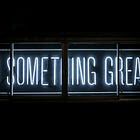I just finished reading The Subtle Art of Not Giving a Fuck by Mark Manson, which you might have seen in the “What I’m Reading” section of recent TFR issues.
This one’s been on my list for a while as friends, both in real life and from the internet, recommended it to me so it finally made the packing list during my recent trip to Italy. I did take the liberty of removing the blaze orange cover while reading it on a crowded Trenitalia carriage—because nothing says “thoughtful American traveler” like flashing a bright orange book with the word FUCK in bold letters on the cover during a quiet train ride through the Italian countryside.
But after reading, it was worth the extra weight.
I didn’t know much about Mark Manson before this experience, but I do know a thing or two about giving a fuck. For starters, this fun four-letter expletive is high on my list of favorites.
I’m also no stranger to caring way too much about way too many things.
I care about my work, my family, being a decent person. I care about making time to think, write and read. I care about politics, I care about the outdoors. I (unfortunately) care about the Cleveland Browns. I care about my lawn, and on frequent occasions, I care way too much about my neighbor’s weed-filled one too.
That’s exactly why I connected with this book, because I give a fuck about WAY too many things and I’m not afraid to admit it.
But letting go of the insignificant isn’t easy. Even after reading this book, I found myself getting worked up over trivial things at work. My wife, who never misses an opportunity for a reality check, happily reminded me: “that doesn’t even matter, you’re going to be okay.”
I should probably just listen to her on all matters… but why do that when I can buy books on Amazon instead?
It’s no surprise that most of us are mentally wired to care about everything, especially once it becomes a habit. In his book, Manson reframes cares (aka fucks) as values, and it’s up to you to choose the right things to care about, because unless you’re a sociopath, you can’t eliminate caring altogether.
“When we choose better values, we are able to divert our fucks to something better—towards things that matter, things that improve the state of our wellbeing, and that generate happiness, pleasure, and success as side effects.”
MARK MANSON
Using myself as an example. I obviously value my work, but I had to think deeper about what exactly about it that I value.
Do I value condescending clients? Nope.
Do I value answering redundant emails or giving presentations that feel like I’m just stating the obvious? Absolutely not.
But there’s more to my job than that.
Do I value the experience and growth I’m gaining? Yes.
Do I value the relationships I’m building with the people I work with? Definitely.
Do I value the stability my job provides, letting me be home every evening without moral conflict or physical exhaustion? Absolutely.
When I reframed it like that, the bullshit I was getting mad about didn’t feel so important anymore. And that’s the whole point.
You don’t HAVE to give a fuck about everything.
You GET to give a fuck about some things.
A Lesson for the Ages
This idea of focusing on what truly matters isn’t new. People have been talking about it for literally hundreds of years.
"Do few things, but do them well. Simple joys are holy."
SAINT FRANCIS of ASSISI
Problems don’t change. They’re the same as they’ve always been, generation after generation, culture after culture. The only thing that changes is how we deal with them.
Life is neither a black and white or binary process. We don’t go from “wrong” to “right” overnight. Instead, we go from “wrong” to “slightly less wrong” on a daily basis.
Progress, not perfection, is the goal.
Like many people, I’ve spent a good amount of time quietly wishing the world worked the way I wanted it to. But living with that expectation only leads to frustration, what Manson calls the “Personal Feedback Loop from Hell.”
The more you expect the universe to cater to you, the more you get stuck in a cycle of frustration, always wanting more but never finding it.
This ties into another idea that Manson and philosopher Alan Watts both explore:
Self-improvement and success often go hand in hand, but they’re not the same thing.
The harder we chase success, the more we reinforce the feeling of not having it. Watts’ Backwards Law explains that the desire for more positive experience is itself a negative experience. And, paradoxically, the acceptance of one’s negative experience is itself a positive experience
Agree to Disagree
While I found a lot of value in Manson's ideas, there are a few ideas where I don’t fully align.
Manson suggests that the same values that can guide us can also trap us. “Knowing” or “finding” yourself can lock you into a rigid identity, closing off future potential. I agree that we should avoid boxing ourselves in, but I also believe there’s value in knowing where you came from to figure out where you’re going.
Tradition and self-awareness don’t have to confine you; they can serve as a map for your future. When we reflect on our past—our upbringing, family traditions, or cultural values—we gain a clearer sense of why we hold certain beliefs or act in specific ways. They show you not only the roads you’ve already traveled, but the ones you still might explore.
For me, knowing my roots has provided clarity and purpose. It’s helped me see which parts of my life have meaning and which parts I can let go of. It’s the balance between reflection and forward momentum that keeps you grounded while still pushing you to grow.
I agree that we shouldn’t be putting ourselves in boxes, but there’s a difference between staying flexible and feeling like you’re never enough. At some point, you have to put the pencil down and assess the story you’ve been writing. Does it even make sense anymore?
Another idea I wrestle with is Manson’s view on the diminishing returns of new experiences. He argues that constantly chasing new adventures or skills spreads you too thin. “Jack of all trades, master of none” is a phrase we’ve all heard. But I’ve always believed in being well-rounded. Just because you didn’t discover a passion or hobby until later in life doesn’t mean you shouldn’t pursue it.
I’ve taken on plenty of different interests in my life, and while it may not have made me an “expert” in any one thing, it’s made me a more curious and open person. To me, that’s valuable in its own right.
The Subtle Art of Personal Strategy
I’ve been working on this idea of Personal Strategy for a while now—the idea that we can apply strategic thinking to our own lives, the same way brands do, to cut through the noise and get somewhere meaningful.
My key takeaway from this book is the idea that growth isn’t about constantly adding more ideas or data to your strategy. It’s about getting sharper, refining what’s in front of you, and focusing on the few things that genuinely deserve your time.
For me, this is a shift.
I’m learning that growth and success aren’t always about adding more to the plate, but about refining what’s already there. I’m also realizing that my path forward should not always be about striving for every new opportunity or spreading myself thin with what I think I should be doing. Rather, I need to start focusing on the opportunities I’m currently in, and take advantage of those before worrying too much about what comes next.
“Like the road not taken, it was the fucks not given that made all the difference.”
From My Desk:
What I’m Thinking About: I recently fell down a rabbit hole of football coaching theory. I watched a profile on two of the most successful football minds in Saban and Belichick, dove into the unique creativity of Mike Leach (RIP), and reluctantly took a closer look at the quirky dynamics of the Harbaugh family (without getting too close, I am a Buckeye after all).
I’m thinking about how great coaches inspire their teams, but more specifically about where they pull their own inspiration from. Expect to see something about this soon...
What I’m Reading: Now that The Subtle Art is crossed off the reading list… I’m diving back into the fly fishing sequel, THE BELIEVER by David Coggins.
On Deck for Monday: As the air here in Ohio is getting a little bit colder, we’re also seeing clients start to slow down towards the end of the year as budgets and focus start to dwindle. I’m not mad about it, as fewer concrete client deliverables will allow me to put some more effort into internal strategy work that will help our team improve next year from a process and efficiency perspective.
From The Field Review Archives:
The Field Review is a space for exploring the intersection of work, life, and the great outdoors. It’s about figuring ‘it’ out—whatever your ‘it’ might be.
Every Sunday at 10AM EST, I share ideas, insights, and conversations that help break through the noise, offering a real look at how we can all keep moving forward.
If you have any thoughts, questions, or topics you'd like me to explore in future newsletters, feel free to reach out!
Venture Onward,
Jack








Loved this and your idea of personal strategy. As someone who used to also worry about a lot of things I should not give any fucks about, Manson's book helped me to be more focused in how I spend my energy. I sometimes come back to the book and re-read my favourite chapters.
It made me reflect on certain things, on whether "this would matter in 5 years from now" and I am more careful now on the things I choose to spend my fucks on, because they are limited.
A jack of all trades is a master of none, but oftentimes better than a master of one.